| Chinglish, abolish or not? | |
|---|---|
| Sep 9, 2009 03:09 | |
 | Chinglish, Chinese English, refers to the ungrammatic words and expressions in spoken and written English used by Chinese people in the daily communication. When you visit China, you may have noticed a plenty of Chinglish expressions. Some foreigners may find Chinglish annoying, while others think it doesn’t matter because Chinglish is comprehensible to the native speakers. Some Chinese English expressions are very funny and interesting. Some Chinglish words like “Long time no see” (好(hǎo)久(jiǔ)不(bú)见(jiàn) have been accepted by the native speakers. An online poll conducted in Shanghai shows that 70 percent of Chinese are for the use of Chinglish. Chinese people can understand Chinglish very well. A poll also selects the top “Chinglish expressions”. 好好学习(hǎo hǎo xué xí),天天向上(tiān tiān xiàng shàng)(Good good study, day day up!) is on the top of the list, which means “study hard, and makes progress everyday!” Have you ever seen some Chinglish signs? Can you understand them? Do you think if Chinglish should be abolished or not? Chairman Mao Tse-tung used to encourage the Chinese pupils to study hard and make progress everyday!好(hǎo)好(hǎo)学(xué)习(xí),天(tiān)天(tiān)向(xiàng)上(shàng) - Good good study, day day up! (Study hard, make progress everyday!)  |
Last edited by LEONARDO: Sep 9, 2009 03:42 | |
| Sep 9, 2009 03:19 | |
 | Here are some chinglish signs: Pre-paid phone cards=手机充值卡 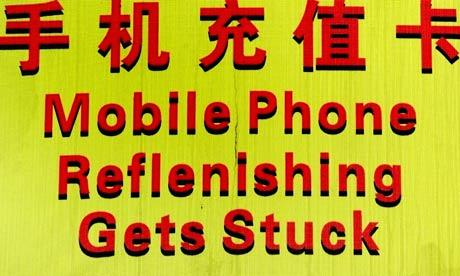 |
Last edited by LEONARDO: Sep 9, 2009 03:40 |
| Sep 9, 2009 03:30 | |
 | 散(sàn)干(gān)果(guǒ) should be " assorted preserved fruit" or "bulk preserved fruit". The sign is found in a Chinese supermaket. ^_^!   |
| Sep 9, 2009 03:35 | |
 | Chinglish signs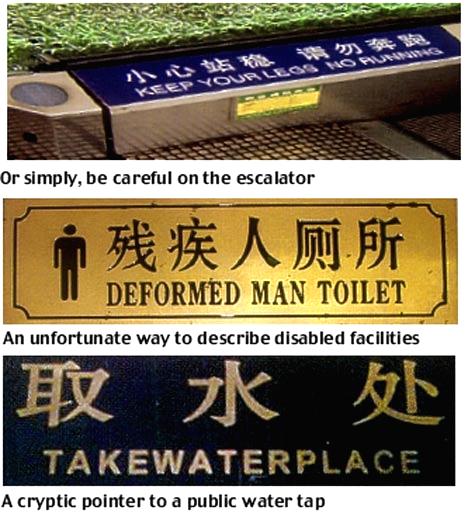 |
| Sep 9, 2009 04:35 | |
 | Leonardo, great post as usual. Compared to my very feeble attempts to speak Chinese mixed in with English if I can’t remember the correct word, as long as I understand the drift of the conversations Chinglish is fine by me. At least they are trying to communicate. If you want to hear really bad English spoken travel to England. In some parts it’s almost unintelligible. Dodger. |
| Sep 9, 2009 06:53 | |
 | How to define chinglish? Were " tou fu" and ""kong fu" regarded as chinglish when they were used several years ago? i think it is reasonable to adopt some mandrin words and phrases into english(not cantonese), especailly names of foods. “steamed stuffed bun”is the translation of 包子. Can it make your mouth water? By the way, since English has already taken in so many japanese words, i don't think there would be any excuse to reject chinese. |
| Sep 9, 2009 23:09 | |
 | English language has borrowed many words from other languages: latins, French, Japanese. A plenty of Chinglish signs at the public stations are quite misleading. It is better to use the grammatically correct English. The following sign appears in a subway station of a Chinese city. What does the English sentence mean? Such Chinglish should be avoided.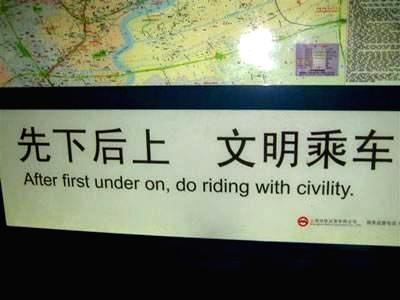 |
| Sep 13, 2009 22:45 | |
 | Leonardo, interesting post! I saw a similar sign at a public bus stop in Kaifeng of Henan province. It reads: civilization ridership, please consciously queue. I don't know the meaning of ridership. I have to check it out. The online merian-webster says readership means "the number of persons who ride a system of public transportation". So I think the sign is Chinglish. The sign is to call for passengers to be in order and well-behaved when they board on the bus. Any I right? Please feel free to correct me if I am wrong. |
Last edited by FADISH: Sep 13, 2009 22:47 |
| Sep 14, 2009 08:16 | |
GUEST33246  | Hi Leonardo, Where did you see this poll you refer to? I would like to have a look! Thanks, Marius http://chinglish.com/ |
| Sep 15, 2009 22:36 | |
 | OMG! This one is hilarious! |
Page 1 of 2 < Previous Next > Page:
Post a Reply to: Chinglish, abolish or not?



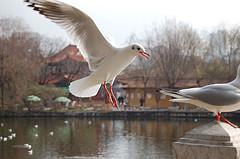
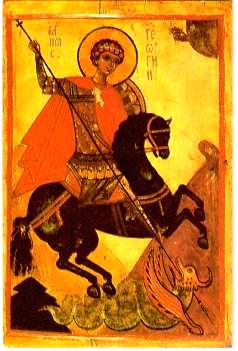

 Copyright © 1998-2026 All rights reserved.
Copyright © 1998-2026 All rights reserved.